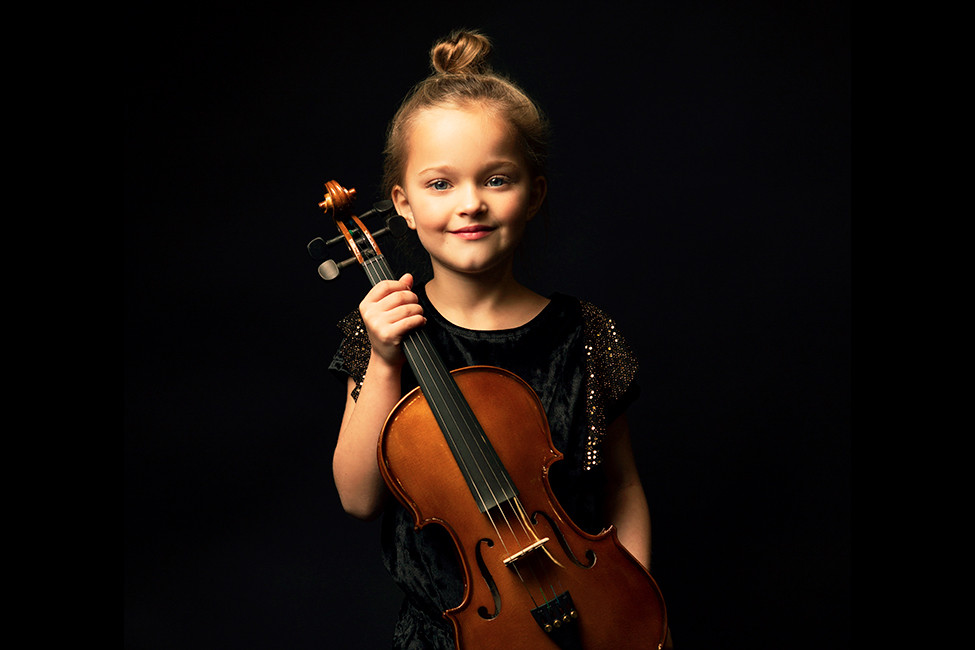How to Immerse Kids in Music Education in Central Arkansas

From sweet lullabies to toe-tapping jazz to the top 20 hits playing on nearly every car radio, music is all around us in countless different forms.
Immersing kids in music can expand their horizons and gives them opportunities to express themselves, to work with others in group settings such as a band and to polish and hone a personal talent.
While music can look different for everyone, some of the benefits are universal. Logan Brown, director of Little Rock School of the Arts (LRSA), says that he views music as a tool that provides perspective into the lives of others and that learning to play music offers other life lessons and skills.
“Playing music teaches you discipline, confidence teamwork and things about yourself,” Brown said. “It helps you understand hard work and rewards you for that hard work.”
LRSA’s main focus is individual and group lessons for students interested in learning to play a particular instrument, so their students are generally at least 6 or 7 years old.
However, according to Paige Majors, director of Second Presbyterian Preschool, even infants benefit from music immersion and classes, which is why all of the students at the preschool participate in Kindermusik classes supplemented with other music instruction.
“We start music classes in the infant room; they’re never too young to be exposed to a quality music program. As they progress, each age group will do something a little more advanced,” Majors said. “I’ve seen in the music room, children under a year - they can’t speak, they can’t sing, but they can do the hand motions they know the songs.”
Even at the preschool level, Majors said she’s seen over and over the way music helps kids who may struggle academically.
“There are lots of children that have issues being in a classroom setting and staying on task and focusing, but I’ve seen it time and time again that when they come to music it’s a completely different situation,” Majors said. “Those children don't have the level of frustration that you see them have in a regular academic setting. They can succeed and thrive in a music setting.”
What Can Your Child Do?
While the idea of music education may seem intimidating to parents without a musical background, Brown says it can be simple. Here are different activities and ways to engage your kids in music, suggested by Brown, Majors and Melanie Hanna, music teacher at Second Presbyterian Preschool.

Ages 1-5
• March to the beat of a song to build rhythm awareness.
• Clap rhythms together.
• Have small instruments such as shakers, tambourines or miniature keyboards for kids to hold and play at home.
• Sing with your children and encourage finger play (think “Itsy Bitsy Spider”).
• Attend one of the free, weekly Music & Movement classes at LRSA. Classes meet each Friday at 9 a.m. and 10 a.m. at 315 S. Hughes St. in Little Rock.
Ages 6-10
• Continue to immerse kids in a variety of music — from rock ’n’ roll to Bach.
• Let your children decide what they’re interested in, whether that be drums, flute or violin. Putting too much pressure on kids can lead to them losing the passion and joy they find in music and viewing it as a chore, according to Brown.
• If you’re not ready to make the financial commitment to private lessons, start with group lessons, which are more affordable and allow your child to decide of he or she really loves the instrument they’ve chosen.
Ages 10 & up
• By around age 10, your child should be taking lessons seriously — practicing consistently at home and developing higher level skills. “It’s your education so what do you want to do with it?” Brown said. “This is where we start connecting the dots for their musical dreams and aspirations.”
• It’s important to keep your kids accountable for practicing but not to harp on them too much. Make sure music is still bringing them joy.
• Opportunities for involvement in bands, ensembles and other groups will become more prevalent as kids enter middle and high school.
Statistics Say

• Music education positively affects students’ abilities in other subjects. A study showed students in elementary schools with superior music education programs scored around 22 percent higher in English and 20 percent higher in math scores on standardized tests, compared to schools with low-quality music programs. (PBS)
• Music is a career opportunity. The arts produce jobs generating an estimated $37 billion. (American Arts Alliance Fact Sheet)
• Music accelerates brain development. Music especially helps in the areas of language acquisition and reading skills at a very young age. (University of Southern California’s Brain and Creativity Institute)
• Music accelerates learning. Students struggling scholastically caught up to their peers in reading and surpassed their classmates in math by 22 percent after participating in music instruction for seven months. (Children’s Music Workshop)
